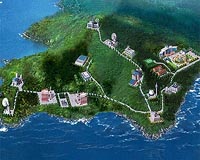 |
Seoul, South Korea (Yonhap) Aug 31, 2009 South Korea's first launch of a rocket must be viewed as a success, despite its inability to place a satellite into orbit, a former science and technology minister claimed Sunday. Oh Myung, currently president of Konkuk University, said the launch of the Korea Space Launch Vehicle-1 (KSLV-1) last week was a success since the rocket and satellite payload reached an altitude of over 300km. The KSLV-1, also called the Naro-1, blasted off from the Naro Space Center 485km south of Seoul on Tuesday, but failed to deploy the 100kg scientific satellite because one of the two nose fairings failed to detach. The mishap made it impossible for the second stage rocket to reach the speed and altitude needed to keep the satellite from falling back into the atmosphere. The academic, who helped sign a space cooperation pact with Russia in September 2004 as head of the country's science policy, stressed that even countries like the United States experience setbacks when launching rockets. "The U.S. reported a total of eight problems related to fairings in the past, with one taking place this year," he pointed out, adding that the success rate is less than 30 percent for a locally assembled rocket launched from its own soil and carrying a payload into orbit. He said that while there is a long way to go, the country has made considerable headway since the 1990s, when it tested its first rockets. Oh said that through cooperation with Russia, the country has gained valuable know-how on how rockets are designed, built, tested and launched, and the country has built a space center that can launch future rockets into space. He said that while space exploration is expensive, it is something South Korea must become good at if it wants to join the ranks of leading industrialized countries. Technologies used to make both rockets and satellites encompass almost all cutting-edge scientific areas and can lead to further advances in mechanics, chemistry, electronics and communication. In addition, he said that while the first stage rocket was built in Russia, the knowledge gained should not be discounted. Before cooperation with Russia started in 2002, Seoul was only able to build a rocket with a thrust of 17t, but it has since completed building a unit capable of 35t, with a more powerful engine being developed to launch a fully indigenous rocket by 2018. The university president, meanwhile, warned that there is no need to "excite" Russian counterparts because they have done their part to help Seoul's space program. "Unlike other areas, foreign countries are unwilling to help South Korea gain access to rockets and other types of technology," he stressed, making clear that Seoul was "lucky" to get Russian help. "At the time Russia signed the formal cooperation agreement in 2004 that got the project moving forward, it was strapped for cash, so it accepted our offer to jointly build the rocket," he said. Oh said that the important thing at this juncture is to learn from past shortcomings and prepare for the next launch, scheduled for next year. He said that only by overcoming shortcomings can South Korea hope to become a global leader in this sector in the next decade.
Source: Yonhap Share This Article With Planet Earth
Related Links Korea Aerospace Research Institute Launch Pad at Space-Travel.com
 Naro Space Center To Become Cradle Of South Korea's Space Program
Naro Space Center To Become Cradle Of South Korea's Space ProgramSeoul, South Korea (Yonhap) Aug 26, 2009 Naro Space Center aims to become the cradle of South Korea's aspirations to build up its nascent aerospace sector, the state-run think tank operating the facility said Tuesday. Located 485km south of Seoul, the sprawling complex covering 5.07 million square meters was built at a cost of 312.4 billion won (US$251.4 million), with construction beginning in January 2005, the Korea Aerospace ... read more |
|
| The content herein, unless otherwise known to be public domain, are Copyright 1995-2009 - SpaceDaily. AFP and UPI Wire Stories are copyright Agence France-Presse and United Press International. ESA Portal Reports are copyright European Space Agency. All NASA sourced material is public domain. Additional copyrights may apply in whole or part to other bona fide parties. Advertising does not imply endorsement,agreement or approval of any opinions, statements or information provided by SpaceDaily on any Web page published or hosted by SpaceDaily. Privacy Statement |